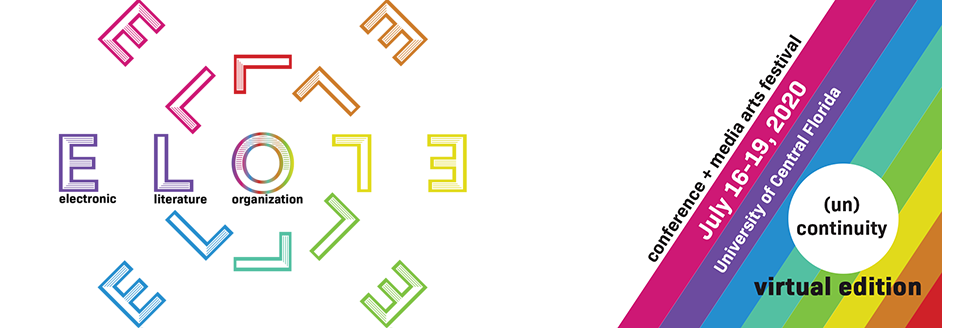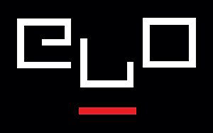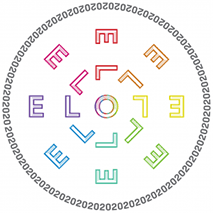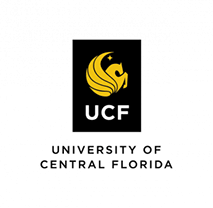Loading...
Submission Type
Virtual Engagement Session
Start Date
18-7-2020 11:00 AM
End Date
18-7-2020 12:00 PM
Abstract
Revised format for virtual conference:
-
Each paper (20 min presentation time) will be submitted in video format and as written up scripts (for accessibility) prior to the event. We would expect our attendees to come to this session prepared, having read or watched the full versions of each contribution;
-
60-minute synchronous virtual roundtable at the event, featuring:
-
5-10 min summative flash presentations of each paper (30 min max.), followed by
-
Online discussion and Q&A with the audience (30 min.)
-
To enable all panelists to present at a humane time of the day (Zooming in from Canada, South Africa, and the UK), we would like to suggest scheduling the live panel for around 11 a.m. local time in Orlando.
Panelists (in alphabetical order):
-
Dr. Astrid Ensslin, University of Alberta (Canada); ensslin@ualberta.ca
-
Dr. Franci Greyling, North West University (South Africa); Franci.Greyling@nwu.ac.za
-
Dr. Lyle Skains, Manchester Metropolitan University (UK); l.skains@mmu.ac.uk
-
Gustaf Tempelhoff, North-West University (South Africa); mrgustaft@gmail.com
-
Christine Wilks, Bath Spa University (UK) / University of Alberta (Canada); crissxross@gmail.com
Abstract
This tri-continental panel explores methods of applied electronic literature research (Ensslin et al. forthcoming) that involves participatory research-creation with the intent to facilitate mental well-being, equity, and social change. We critically evaluate key methodological and ethical concerns relating to EDI-oriented participant sampling and digital narrative design by focusing on three social justice informed research projects: (1) The “Writing New Bodies” project, presented by Ensslin and Wilks and funded by the Social Sciences and Humanities Research Council of Canada, is developing a digital fiction “world of stories” for body image bibliotherapy aimed at young woman-identified and gender non-conforming individuals with body image concerns. (2) The “You and CO2” and “Infectious Storytelling” projects, presented by Skains and supported by the Welsh Crucible, are using creative media to engage secondary schools with the issue of climate change, and to effect positive behaviour change regarding antimicrobial resistance, respectively. (3) The “Byderhand-Pioneer” project, presented by Greyling and Tempelhoff, is a collaboration of the North-West University and a school for visually impaired learners in South Africa. It facilitates the creation and experience of locative literature through accessible interfaces.
Ensslin’s and Wilks’ joint paper will introduce the digital fiction resulting from the participant research done in Writing New Bodies (Ensslin et al. 2020). It will discuss the strengths and shortcomings of using Feminist Participatory Action Research (Gustafson et al. 2019) with a group of young, woman-identified and gender-non-conforming participants (ages 18-25) who were involved in critically co-designing and testing a digital fiction for body image bibliotherapy. We will reflect on the creative process, from its basis inspired by the results of participant research to ludonarrative and interface design and software development.
Video link to Astrid's and Christine's paper: https://www.youtube.com/watch?v=OyFBC7Dq2w4&feature=youtu.be
Skains’ paper will present two pilot studies (You and CO2; Infectious Storytelling) on utilizing reading and/or writing digital fiction to effect positive attitude change regarding, respectively, personal contributions to climate change and actions leading to antimicrobial resistance. The studies presented are an examination of the efficacy of entertainment media, specifically digital fiction, to purposefully effect positive behaviour without resorting to obviously “edutainment” games that audiences receive negatively. This paper will discuss the practice-based exploration of writing digital fiction to (educational) spec, including the creative challenges posed by writing for specific audiences/age groups, to specific lengths, with specific technological considerations, for specific educational and psychological effects.
Video link to Lyle's full paper: https://www.youtube.com/watch?v=YBpKOD2KKew&feature=youtu.be
Greyling and Tempelhoff will contextualise the participatory dynamics involved in the co-creation, development and implementation of accessible locative literature in a multisensory garden at a school for the visually impaired. The Byderhand-Pioneer project comprises multimodal and multilingual poems and stories written mainly by writers with visual impairment. We will illustrate how collaboration and user centred design resulted in the development of an inclusive multi-layered interface consisting of tactile, audio and graphical interaction. Finally we will discuss how the installation contributes to an enriched learning environment as well as deepened experiences of place and literature.
Video link to Franci's and Gustaf's full paper: https://www.youtube.com/watch?v=J-XpA9IaNRc&feature=youtu.be
Works Cited:
Ensslin, Astrid, Carla Rice, Sarah Riley, Megan Perram, Hannah Fowlie, Lauren Munro and Aly Bailey (2020) “These Waves ...:” Writing New Bodies for Applied E-literature Studies,” electronic book review.
Gustafson, Diana L., Janice E. Parsons, and Brenda Gillingham (2019) “Writing to Transgress: Knowledge Production in Feminist Participatory Action Research.” Forum: Qualitative Social Research, 20(2), 1-25.
Skains, R. Lyle, Jennifer Rudd, Carmen Casaliggi, Emma Hayhurst, Ruth Horry and Kate Woodward (forthcoming) Choose Your Own Global Future: Using Interactive Digital Narrative for Science & Health Education. Bingley, UK: Emerald Publishing.
Ensslin and Wilks paper with video link
ELO2020_Greyling_Tempelhoff_20200630_FINAL.pdf (543 kB)
Greyling and Tempelhoff's paper
Applied E-Lit as Participatory Research-Creation for Social Change
Revised format for virtual conference:
-
Each paper (20 min presentation time) will be submitted in video format and as written up scripts (for accessibility) prior to the event. We would expect our attendees to come to this session prepared, having read or watched the full versions of each contribution;
-
60-minute synchronous virtual roundtable at the event, featuring:
-
5-10 min summative flash presentations of each paper (30 min max.), followed by
-
Online discussion and Q&A with the audience (30 min.)
-
To enable all panelists to present at a humane time of the day (Zooming in from Canada, South Africa, and the UK), we would like to suggest scheduling the live panel for around 11 a.m. local time in Orlando.
Panelists (in alphabetical order):
-
Dr. Astrid Ensslin, University of Alberta (Canada); ensslin@ualberta.ca
-
Dr. Franci Greyling, North West University (South Africa); Franci.Greyling@nwu.ac.za
-
Dr. Lyle Skains, Manchester Metropolitan University (UK); l.skains@mmu.ac.uk
-
Gustaf Tempelhoff, North-West University (South Africa); mrgustaft@gmail.com
-
Christine Wilks, Bath Spa University (UK) / University of Alberta (Canada); crissxross@gmail.com
Abstract
This tri-continental panel explores methods of applied electronic literature research (Ensslin et al. forthcoming) that involves participatory research-creation with the intent to facilitate mental well-being, equity, and social change. We critically evaluate key methodological and ethical concerns relating to EDI-oriented participant sampling and digital narrative design by focusing on three social justice informed research projects: (1) The “Writing New Bodies” project, presented by Ensslin and Wilks and funded by the Social Sciences and Humanities Research Council of Canada, is developing a digital fiction “world of stories” for body image bibliotherapy aimed at young woman-identified and gender non-conforming individuals with body image concerns. (2) The “You and CO2” and “Infectious Storytelling” projects, presented by Skains and supported by the Welsh Crucible, are using creative media to engage secondary schools with the issue of climate change, and to effect positive behaviour change regarding antimicrobial resistance, respectively. (3) The “Byderhand-Pioneer” project, presented by Greyling and Tempelhoff, is a collaboration of the North-West University and a school for visually impaired learners in South Africa. It facilitates the creation and experience of locative literature through accessible interfaces.
Ensslin’s and Wilks’ joint paper will introduce the digital fiction resulting from the participant research done in Writing New Bodies (Ensslin et al. 2020). It will discuss the strengths and shortcomings of using Feminist Participatory Action Research (Gustafson et al. 2019) with a group of young, woman-identified and gender-non-conforming participants (ages 18-25) who were involved in critically co-designing and testing a digital fiction for body image bibliotherapy. We will reflect on the creative process, from its basis inspired by the results of participant research to ludonarrative and interface design and software development.
Video link to Astrid's and Christine's paper: https://www.youtube.com/watch?v=OyFBC7Dq2w4&feature=youtu.be
Skains’ paper will present two pilot studies (You and CO2; Infectious Storytelling) on utilizing reading and/or writing digital fiction to effect positive attitude change regarding, respectively, personal contributions to climate change and actions leading to antimicrobial resistance. The studies presented are an examination of the efficacy of entertainment media, specifically digital fiction, to purposefully effect positive behaviour without resorting to obviously “edutainment” games that audiences receive negatively. This paper will discuss the practice-based exploration of writing digital fiction to (educational) spec, including the creative challenges posed by writing for specific audiences/age groups, to specific lengths, with specific technological considerations, for specific educational and psychological effects.
Video link to Lyle's full paper: https://www.youtube.com/watch?v=YBpKOD2KKew&feature=youtu.be
Greyling and Tempelhoff will contextualise the participatory dynamics involved in the co-creation, development and implementation of accessible locative literature in a multisensory garden at a school for the visually impaired. The Byderhand-Pioneer project comprises multimodal and multilingual poems and stories written mainly by writers with visual impairment. We will illustrate how collaboration and user centred design resulted in the development of an inclusive multi-layered interface consisting of tactile, audio and graphical interaction. Finally we will discuss how the installation contributes to an enriched learning environment as well as deepened experiences of place and literature.
Video link to Franci's and Gustaf's full paper: https://www.youtube.com/watch?v=J-XpA9IaNRc&feature=youtu.be
Works Cited:
Ensslin, Astrid, Carla Rice, Sarah Riley, Megan Perram, Hannah Fowlie, Lauren Munro and Aly Bailey (2020) “These Waves ...:” Writing New Bodies for Applied E-literature Studies,” electronic book review.
Gustafson, Diana L., Janice E. Parsons, and Brenda Gillingham (2019) “Writing to Transgress: Knowledge Production in Feminist Participatory Action Research.” Forum: Qualitative Social Research, 20(2), 1-25.
Skains, R. Lyle, Jennifer Rudd, Carmen Casaliggi, Emma Hayhurst, Ruth Horry and Kate Woodward (forthcoming) Choose Your Own Global Future: Using Interactive Digital Narrative for Science & Health Education. Bingley, UK: Emerald Publishing.




Bio
Astrid Ensslin (she/her) is Professor in Digital Humanities and Game Studies, who divides her teaching and research activities between the Departments of Modern Languages and Cultural Studies, and Digital Humanities at the University of Alberta. Her main publications include Small Screen Fictions (Paradoxa, 2017, co-edited with Lisa Swanstrom and Pawel Frelik), Literary Gaming (MIT Press, 2014), Analyzing Digital Fiction (Routledge, 2013, co-edited with Alice Bell and Hans Kristian Rustad), The Language of Gaming (Palgrave, 2011), Creating Second Lives: Community, Identity and Spatiality as Constructions of the Virtual (Routledge, 2011, co-edited with Eben Muse), Canonizing Hypertext: Explorations and Constructions (Bloomsbury, 2007), and Language in the Media: Representations, Identity, Ideology (Bloomsbury, 2007, co-edited with Sally Johnson). She is PI of the “Writing New Bodies” project funded by the Social Sciences and Humanities Research Council of Canada, Director of the Electronic Literature Directory, and Editor of the C.U.P. Elements “Digital Fictions” minigraph series and the Bloomsbury “Electronic Literature” book series.
Franci Greyling is Professor in Creative Writing at the North-West University, Potchefstroom, South Africa. Since 2007 she has been involved in the conceptualization and execution of multi-practitioner interdisciplinary creative and research projects in the Faculty of Arts. The Byderhand (At hand) project (2015-2020) on site-specific digital literature, which she initiated and still co-manage, was originally launched at a National Arts Festival in South Africa and has been awarded as a ground breaking production. Franci’s scholarly publications include around 25 peer-reviewed journal articles and book chapters; her creative publications comprise artists' books, children's books, young adult novels, short stories, poetry, radio theatre and a website (Storiewerf) for the promotion of Afrikaans children’s literature.
Lyle Skains (she/her) researches and teaches Creative Writing and Digital Media, exploring multimodal creativity, genre fiction, and writing and reading/playing transmedia narratives, and writing and publishing in the 21st century. Her research is largely practice-based, stemming from her work in creative writing (speculative fiction) and digital writing. She is currently a Senior Lecturer at Manchester Metropolitan University, building upon her experience as a professional writer in prose and the film and technical industries. She is the founder of Wonderbox Publishing, which publishes speculative fiction and digital fiction, aiming to explore innovations in digital and online publishing and creativity. Her digital fiction can be found at lyleskains.com; articles in Convergence, Digital Creativity, and Computers and Composition; and books with Cambridge UP, and forthcoming Emerald and Bloomsbury.
Gustaf Tempelhoff is an MA student in Graphic Design at the North-West University, South Africa. Since 2015 he has been involved as multimedia designer in Byderhand (At hand), a multi-award winning and on-going site-specific digital literature project. As multimedia artist he has been involved in several collaborative art exhibitions. His work includes experimentation with film, 3D sculpting, graphic design, music composition and sound design. In 2017 he was part of the -arium exhibition at the Barnard Gallery in Cape Town as a filmmaker, composer and 3D artist (https://youtu.be/dKqeSIxCe4Q). Gustaf has also found his way into the film industry as a visual effects artist. As a LiDAR (3D scanning) operator his work has been notably present in films such as Tomb Raider 2018, Mowgli 2018 and segments of Maze Runner 2018 and The Avengers 2016. Gustaf’s exposure to these diverse contexts, creative possibilities, social and environmental problematics, has fuelled his passion for artistic, collaborative and research based projects and problem solving.
Christine Wilks is a digital writer, artist, and developer of interactive narratives and playable media. She is currently building her own platform for authoring and playing text-driven interactive digital narratives, which she is using to develop an interactive psychological thriller. Her digital fiction, Underbelly, won the New Media Writing Prize 2010 and the MaMSIE Digital Media Competition 2011. Her work is published in online journals, exhibitions and anthologies, including the Electronic Literature Collection, Volume 2 and the ELMCIP Anthology of European Electronic Literature, and has been presented internationally at festivals, exhibitions and conferences. From 2007 to 2013 she was a core member of the digital arts remixing collective, R3M1XW0RX, and contributed over 100 remixes. Before working in digital media and the web, she made short films, videos, animations, installations and wrote fiction and screenplays. She is in the final phase of her practice-based PhD in Digital Writing at Bath Spa University and has an MA in Fine Art from Cardiff Institute of Higher Education (UWIC) and an MA(Hons) in Creative Writing and New Media from De Montfort University.